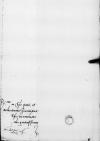List #2980
Stanisław WŁOSZEK do Ioannes DANTISCUSVilnius, 1546-06-23
| odebrano Heilsberg (Lidzbark), 1546-06-29 Rękopiśmienne podstawy źródłowe:
| ||||
Tekst + aparat krytyczny + komentarz Zwykły tekst Tekst + komentarz Tekst + aparat krytyczny
Reverendissimo in Christo Patri et Domino, domino
Reverendissime in Christo Pater et Domine, domine gratiosissime.
Praemissa mei et deditissimorum servitiorum meorum in gratiam Reverendissimae Paternitatis Vestrae commendatione.
Quod Reverendissima Paternitas Vestra meae condolet imbecillitati, est quo nomine illi plurimum me debere fatear, signum namque est adauctae erga me humanitatis Reverendissimae Paternitatis Vestrae. Quid pro ea benignitate rependam, non habeo, nisi quod ea, qua teneor, animi devotione a Domino Deo precor, ut Reverendissimam Paternitatem Vestram diu foveat sospitem et incolumem pro commodo
Veredarium Reverendissimae Paternitatis Vestrae iam cum responso rediisse certum est. Eadem hoc nuntio significavit sacrae
Cuius gratiae me et deditissima servitia mea supplex commendo.
Dat(ae) or Dat(um)⌈Dat(ae)Dat(ae) or Dat(um)⌉
Reverendissimae Paternitatis Vestrae deditissimus servitor


 BCz, 1599, p. 724
BCz, 1599, p. 724